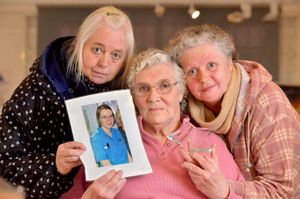Lisa Skidmore's family demand answers at inquest: Why was killer out of prison?
The heartbroken family of a murdered nurse say they hope lessons can be learnt after a full inquest opened into her death.

Lisa Skidmore, aged 37, was raped and murdered by Leroy Campbell on November 24, 2016 after he climbed into her bedroom window in Mill Croft, Bilston.
Campbell, a convicted rapist, had been released from prison that July in a move which saw the probation service criticised for committing ‘appalling mistakes’.
He had spoken of wanting to rape again but was not recalled to prison.
More coverage:
Lisa Skidmore murder: Wolverhampton nurse killer is jailed for life
Lisa’s brother Jim told Black Country Coroners’ Court yesterday: “There are no amount of words to explain the devastation this tragedy has caused for our family and friends.
“For 17 years she had cared for the needs of people, but in her last hours no-one was there for her. We just want to find out why he was out.
“We feel, as a family, if appropriate action was taken, he would have been recalled and apprehended and it wouldn’t have happened.”
He added: “She was one of the most kind, caring and sensitive people we knew, she wouldn’t hurt anyone or any animal.
“My mother has not just lost a daughter but a carer too.”

Leroy Campbell strangled Lisa Skidmore after climbing through the bedroom window of her home and raping her in a sickening attack.
He also attempted to murder her elderly mother with a vacuum cleaner lead before setting fire to the property in 2016.
An inquest is now examining the circumstances around Ms Skidmore’s horrific death and failings by the authorities.
Campbell was given a life sentence on May 12, 2017.
Detective Constable Simon Lees, from West Midlands Police’s homicide unit, said he tried to enter Lisa’s bedroom three days earlier, but aborted his attempt.
It is believed Lisa was off sick that week from work, he said.

Laurence Watkins, Campbell’s former probation officer since 2014, told the court that Campbell was not deemed a high risk to the public before his release from prison.
He had been up for parole previously as he had served 16 years since 2000 for a previous offence.
Campbell was released from prison in July 2016 and was put up at a hostel in Bilston – a ‘short distance’ from Lisa’s home, said DC Lees, but it was not known why he targeted Lisa.
He was then moved to a hostel in Moseley by the probation service so he could be closer to his family.
His family were from the city and he came from Handsworth.
It is at the hostel in Moseley that Campbell began making remarks that caused probation officers concern.
He had told Mr Watkins’ colleague, as Mr Watkins was on holiday, that Campbell was ‘noticing open windows and feeling guilty of offences of a similar nature’, the court heard.
The alarming remarks prompted Mr Watkins’ colleague to contact police.

However the remarks did not cause Campbell to become an ‘increased or imminent threat’ to the public in the eyes of the probation service.
“He was feeling at a low point,” said Mr Watkins.
“His daughter had gone to America for work and his son was on holiday. He was feeling low and isolated.”
Weeks earlier while living in the hostel in Bilston, Campbell had discussed about one night stands and ‘having sex with a prostitute’, continued Mr Watkins.
Campbell made the remarks about ‘noticing open windows’ to an officer called Audrey on October 17, 2016, who raised the concerns with senior management.
Mr Watkins carried out an assessment of Campbell on his return to work on November 7 and told coroner Zafar Siddique yesterday that he had been satisfied ‘the risk had been stabilised’.
Campbell, a paranoid schizophrenic, had raped before and, following the attack at the Skidmore home, it emerged he had told a probation worker he was thinking about doing it again.

It was a confession that should have sent alarm bells ringing that the prisoner, who was serving a 16-year ‘public protection’ term at the time, was clearly not fit to be sent back out onto the streets.
But that is exactly what happened and four months after his release he subjected Ms Skidmore to her terrifying ordeal.
One probation worker was sacked for gross misconduct and another demoted when a review of the case found the service had failed to protect the public.
A report report ruled “significant” improvement was needed in the management of sex offenders in prison and on their release, which was described as “poor”.
The inquest which opened in Oldbury yesterday had been due to start last year but was put off until Senior Black Country Coroner Zafar Siddique could be satisfied he was armed with all the necessary information to reach a final conclusion.
Mr Siddique has promised a “thorough and fearless investigation” and the Skidmore family will be hoping for answers.
The hearing continues.





